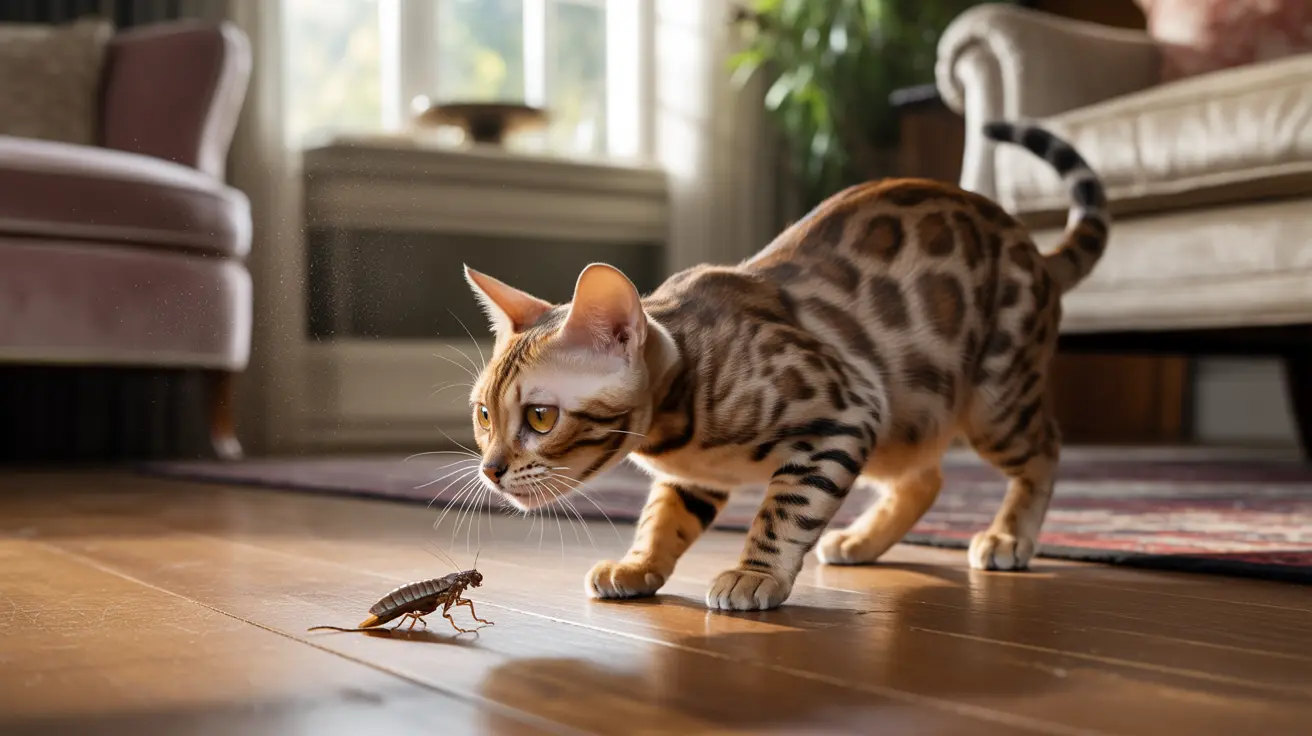If you've ever caught your cat stalking or munching on a cockroach, you're not alone. Cats are natural hunters, and their predatory instincts often lead them to chase and consume insects, including roaches. While this behavior is common, it's important for pet owners to understand both the instinctual drive behind it and the potential health implications.
In this comprehensive guide, we'll explore why cats are attracted to cockroaches, the health risks associated with this behavior, and what you should do if your feline friend makes a meal of these unwanted house guests.
The Natural Hunter: Why Cats Chase Cockroaches
Cats are hardwired to hunt, regardless of whether they're well-fed house pets or feral animals. This instinct dates back to their ancient Egyptian origins, where they were valued for their ability to control pests. The quick, erratic movements of cockroaches trigger a cat's natural hunting response, making these insects particularly enticing targets.
Even indoor cats maintained on regular feeding schedules will often pursue and catch roaches, demonstrating that this behavior is driven by instinct rather than hunger.
Health Risks of Cats Eating Roaches
Immediate Physical Dangers
The first concern when cats eat cockroaches is the physical risk posed by the insect's hard exoskeleton. This chitinous shell can cause:
- Choking hazards
- Mouth injuries
- Digestive tract irritation
- Potential intestinal blockages
Disease and Parasite Transmission
Cockroaches are known carriers of various pathogens and parasites that can affect your cat's health, including:
- Salmonella
- Toxoplasma gondii
- Various intestinal worms
- Bacterial infections
Pesticide Concerns and Toxic Exposure
One of the most serious risks comes from roaches that have been exposed to pesticides. Cats who eat these contaminated insects may experience:
- Vomiting and diarrhea
- Excessive drooling
- Respiratory distress
- Neurological symptoms in severe cases
When to Seek Veterinary Care
While occasional roach consumption usually isn't cause for immediate concern, you should monitor your cat for the following symptoms:
- Persistent vomiting or diarrhea
- Lethargy or unusual behavior
- Signs of choking or gagging
- Loss of appetite
If these symptoms persist for more than 24 hours or appear severe, consult your veterinarian immediately.
Prevention and Management Strategies
To protect your cat from the risks associated with eating roaches, consider these preventive measures:
- Implement effective pest control using pet-safe methods
- Keep your home clean and free of cockroach attractants
- Maintain regular deworming schedules for your cat
- Consider environmental enrichment to satisfy hunting instincts safely
Frequently Asked Questions
Why do cats hunt and eat cockroaches despite having regular cat food?
Cats hunt roaches due to their natural predatory instincts, regardless of their food supply. The movement of cockroaches triggers their hunting response, making them irresistible targets for many cats.
Are cockroaches safe for cats to eat, or do they pose health risks?
While cockroaches aren't inherently toxic to cats, they can pose significant health risks through parasites, bacteria, and pesticide exposure. The hard exoskeleton can also cause digestive issues.
What symptoms should I watch for if my cat eats a cockroach?
Monitor your cat for vomiting, diarrhea, lethargy, loss of appetite, or difficulty breathing. Most cases resolve on their own, but persistent symptoms warrant veterinary attention.
How can I prevent my cat from getting sick from eating cockroaches or pesticides?
Use pet-safe pest control methods, maintain regular deworming schedules, and keep your home clean to minimize roach populations. Consider environmental enrichment to redirect hunting behaviors.
Can cats actually help control cockroach infestations in the home?
While cats may catch and kill some roaches, they shouldn't be relied upon as a primary pest control method. Professional pest management is more effective and safer for your pet.






